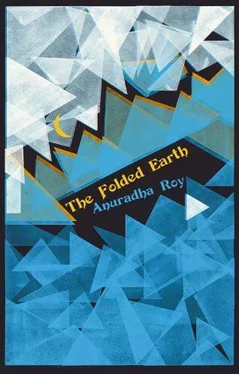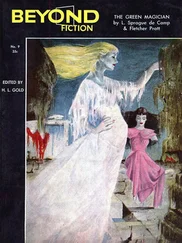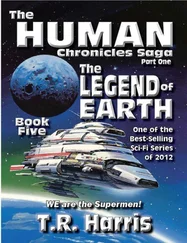For himself, Veer had brought a new wristwatch. If you pressed any of the tiny knobs that ran down each side in a row, it turned from watch to compass, altimeter, thermometer, or barometer. The needles that told the time swung up and down to inform us that in the cantonment we were at about 6,100 feet while St Hilda’s, in the bazaar, was at 5,600 feet. Veer could not stop fiddling with the watch, but when I teased him, saying he was like a child with a new toy, he protested. “This is survival for me. It’s work. It’s like having a phone or a computer. It’ll be my lifesaver in a blizzard on some glacier far from help.”
The rhythm of my life changed whenever Veer returned. My days became changeable. I could not tell if he did it on purpose, but very often he drove up the hill from the bazaar just around the time I walked up from St Hilda’s to the factory. His jeep would stop beside me, a look would pass between us, and I would get in. Sometimes he paused to buy hot samosas and we took the longer, more isolated route back home, stopping on the way for a brief picnic. I could talk to him in a way I could with no-one else. I knew I would be understood, and knew exactly the conversation we might have when, for example, I said, “I wonder if mules too wear horseshoes.”
Our road had been blocked by a line of sweet-faced, slow-witted mules. They were being urged on with much shouting and prodding by their herdsmen. Some of the mules, living up to their reputation, simply refused to move despite being pushed from behind.
“ Do mules wear shoes or not?” I said. “And what about elephants? Do they wear horseshoes? And if they do, what are the shoes called?”
“A topic most worthy of research,” Veer said. “The field could be extended and deepened. What decides it? Is it soft-footedness or hoofedness? Is it the distance travelled, the load carried? Shall we propose it to my uncle as the subject of his next book?”
“What about bullocks? They have to walk miles. Dragging heavy carts.”
“Not to forget camels,” Veer said in a parody of a formal, professional voice. “And yaks. Have you considered yaks? Nilgai? Zebras? Other than research, I see definite business possibilities here. Maybe you should give up your school and get into making shoes for animals? Might they have standard shoe sizes? Should you outsource the manufacturing to China?”
Once a new teacher at St Hilda’s was in the jeep with us when Veer and I wandered into one such nonsensical conversation. She had wanted to visit me at home — to test out the possibility of a friendship, I suppose. She looked out of the window throughout the drive, saying nothing, and after five minutes I forgot that she was there. After Veer had dropped us off at my door and driven away, she walked through my two rooms picking up this and examining that while I made tea. She paused before the pictures of Michael on my desk, and of my mother, and wanted to know about Michael, about when my mother had died and why I did not return to my father to be with him in his solitary old age. When we had settled down with cups of tea in my veranda, she said, “You talked very funnily with that gentleman in the jeep. Like you’re a mad child. And the way he replied — as if you’re both eight-year-olds. Are you friends? Or is he a relative of yours?”
She gave me a searching look. I changed the subject as soon as I could. Neither she nor I mentioned a next visit when she left.
One evening soon after coming back from his Delhi trip, Veer unveiled his slide projector. With the first slide, the far end of Diwan Sahib’s disused dining room, usually a bare expanse of rough whitewash, turned gold and blue and a sigh went across the room. It was the high altitude desert of Leh: barren gold earth in moon-surface formations beneath a vast sky. The land looked as raw as on the day of creation. In its folds you could see the shifting of continents, the breaking away of the Indian peninsula from Africa, and hear the cosmic boom as it crashed into Asia and thrust the Himalaya out of the ocean.
Another click and we moved to blue goats somewhere on a mountainside, and traditional stone and slate houses that had stood intact through earthquakes when new concrete structures had tumbled into the dust. Then the wall turned indigo with water and a gasp went around the room. Slopes of snow rose out of the liquid and clung to a very blue sky. “This is Pangong Lake,” Veer’s voice said from the back of the darkened room, “in Ladakh. I took a group of Swiss birdwatchers there a few years ago.” A whir and a click lit up another view of the lake. Ama said, “That’s one place in the hills where water won’t ever run short,” and there was a murmur of laughter until Veer said, “It’s salty water.” Ama came back with, “No need to spend on salt then, just boil the vegetables in it straight.”
The room was dark, crowded with shadows of people: all of the hillside — Charu, Ama and their three visiting relatives from a remote village, the deaf-mute twins Beena and Mitu, the clerk from the water board and his young son — had assembled to watch the magic of pictures from Veer’s just-unpacked projector. Ranikhet had only one battered cinema. It cost money. A free slideshow was a novel treat.
“We went by motorbike from Manali to Ladakh — through the Rohtang Pass, the Baralacha La, and we could even see the Karakoram.” The slides moved almost too quickly for us to register details as Veer showed us pictures of prayer wheels, exotic Buddhist dwellings, and the monasteries of Shey, Thikse, Alchi. It was remote, spectacular, and unfamiliar for those of us who had only seen such great heights from a distance. Another click: a view from the Ladakh plateau of barren land far below. Veer said, “That is China; half of Pangong lake falls in China. Nobody is allowed up that close to the boundary, but I knew someone in the Army. We left our motorbikes and trekked all over Ladakh and reached here in the end.”
“So if we start walking today in Ranikhet, one day we will reach China?” This was Ama.
Diwan Sahib said, “You’d get a bullet in your head when you crossed over.” Diwan Sahib had no patience with Ama’s garrulity and what he called her “animal husbandry department”. Every so often he had futile arguments with her over her goats lunching on the lilies and marigolds that still survived in his garden.
“Arre Ama,” the clerk said, “your forefathers and mine walked to China many times. That’s what my great grandfather told me. He went twice with some firanghis in the time of the British.”
There was a babble of voices. “Your great grandfather was a coolie,” Ama said. “What was he doing in China?” Himmat Singh gave a series of phlegmy coughs and struggled up a thought: “I have heard they eat tigers in China. And dogs. They also eat dogs.” “Aah, but then what do the leopards in China eat if the people eat the dogs?” the clerk wanted to know. They laughed. Charu, who had not spoken so far, said, “I would kill any leopard or Chinese who laid a finger on my Bijli.”
“That useless dog has a magic life,” Ama said. “So many dogs get eaten. But this one roams all over in the dark and next morning he’s sitting right there, by the stove, waiting for a roti to fall.”
I sat back, warm in my shawl, feet tucked into it, a woolly bundle listening to voices eddying over me. Diwan Sahib began to talk about the Great Game — the intrigues and spying, the explorers sent in disguise over the undiscovered massifs, passes, peaks, and ravines of the Himalaya by the Russians and the British looking to gain control of them. The names of early travellers fell from his lips like those of old friends: George Moorcroft crossed the fast-flowing Sutlej on the inflated skins of buffaloes and travelled disguised as a Hindu sadhu to search for the goat whose wool made Pashmina shawls. Nain Singh Rawat surveyed the Himalaya to map it accurately for the first time. He was a Pandit from our region, the Kumaon, said Diwan Sahib, and he reached Lhasa, Xinjiang, Nepal, and China not once but three times in the 1860s. His brother Kishen Singh Rawat went to Lhasa too. At that time nobody even knew exactly where Lhasa was.
Читать дальше












